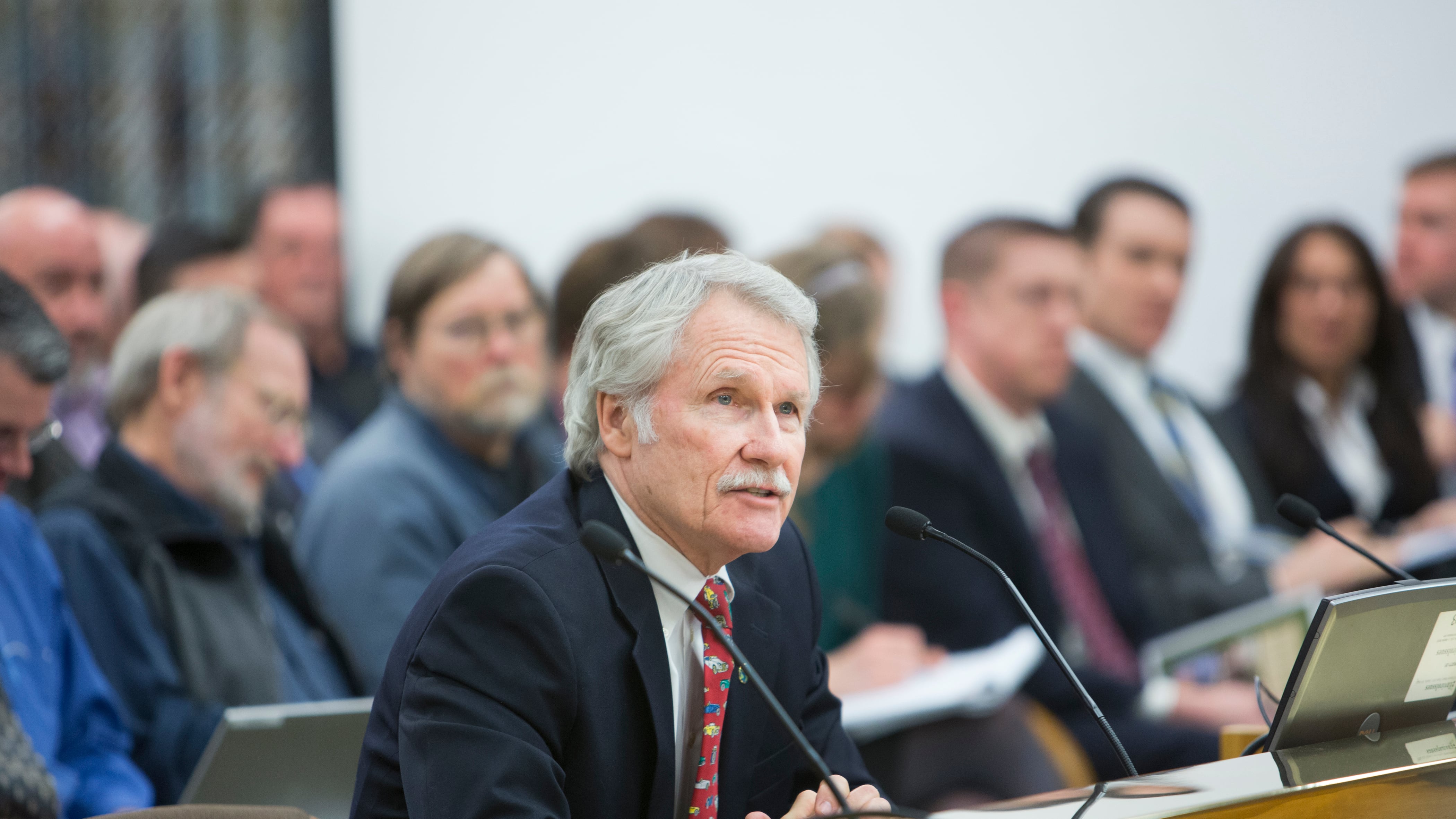Former Gov. John Kitzhaber appeared in front of the Oregon Government Ethics Commission in Salem Friday morning to respond to a staff investigation that found a "preponderance of evidence" that Kitzhaber committed 11 violations of state ethics laws.
After Kitzhaber, 70, made a statement and responded to questions from the commission's eight members, the commission voted to make a preliminary finding that Kitzhaber had committed 10 of the alleged violations.
"You allowed lines to be blurred and to allow [former first lady Cylvia Hayes] to get paid work that benefited your household," ethics commission chair Alison Kean told Kitzhaber.
It was a dramatic morning.
Unlike his fiancee, Cylvia Hayes, who neither showed up for her hearing in January or sent her attorney, the former governor appeared in person, accompanied by his attorney, Janet Hoffman.
Dressed in cowboy boots, pressed jeans and a blue blazer, Kitzhaber greeted the press, with whom he's had a contentious relationship, and addressed the eight-member commission for about 10 minutes.
In respectful, contrite tones, Kitzhaber acknowledged he'd made mistakes and took responsibility for all but one of the violations the ethics commission investigator identified.
"I apologize to my family. I apologize to my former chief of staff and my legal counsel and most of all, to my fellow Oregonians," Kitzhaber said.

"I'm not offering my statement by way of defense but rather to provide you context," Kitzhaber said. "This is the first time in three years I've had the opportunity to appear in front of a body charged with ascertaining objective facts."
Kitzhaber acknowledged he'd failed to properly manage seven separate instances in which former first lady Cylvia Hayes' private consulting contracts presented conflicts of interest.
He also conceded inappropriately accepting a gift worth more than $50 (platinum status on United Airlines) and two counts of using his public office for private gain: allowing public employees to provide care for a pet and thus avoiding costs; and, generating frequent flyer miles while traveling on public business.
Kitzhaber vehemently disputed, however, the third allegation: that he'd used his office for personal gain by creating the conditions that allowed Hayes and her company, 3E Strategies, to obtain contracts worth more than $225,000 from 2011 to 2014.
He said that whatever mistakes he might have made, none was made out of greed or dishonesty.
"The thing that has mattered most to me is my integrity and the respect for the offices I've held," Kitzhaber said.
Kitzhaber said he knew Hayes' desire to both serve as an adviser in his administration and pursue contracts in areas related to her duties in his office would present "ethics challenges."
He said he delegated the oversight of those challenges to his staff and did not know the details of Hayes' contracts or the claims she was making to prospective employers. He took strong issue with the allegation that he had benefited from Hayes' work.
"There was never any intent to use my position to advance her career or enrich myself," Kitzhaber said. "The thing that has mattered most to me is my integrity and the respect for the offices I've held."
Hoffman, Kitzhaber's attorney, argued that although it's not explicitly stated in state ethics laws, the concept that a public official uses his office for personal enrichment requires intent.
Commission Chair Kean and the commission's counsel, Oregon Department of Justice lawyer Amy Alpaugh, pushed back on that contention.
"I reject the notion that these statutes require intent," Kean said. "It would be unfair and wrong to adopt that standard now."
Hoffman also contended that although Kitzhaber filled out state financial disclosure forms listing Hayes as a member of his household, he did so out of an abundance of caution but in fact the couple kept their households and finances separate.
"If there were errors made, they were not for the purpose of financial gain," Hoffman said.
Several commissioners thanked Kitzhaber for appearing and for apologizing and it was clear his presentation affected them positively.
They did not, however, buy the arguments he and Hoffman presented.
"As governor, he had tremendous power and he used that power to open doors for his fiancee to give her access and put her in a position to use that access to enrich herself," said Commissioner Nathan Sosa told his colleagues. "He says he didn't know she was doing that. I think it was incumbent on him to exercise oversight over that situation and not hand it off to staff or counsel."
Kean agreed.
"He had clear knowledge that she was making money working on the same issues on which she was working for him," Kean said, noting Kitzhaber provided Hayes unfettered access to his administration.
"That's valuable," Kean added. "You can sell that, and she did. This was a complete blurring of the lines."
After voting unanimously to find that Kitzhaber violated state ethics laws, the commission will now provide him an opportunity to appeal their decision.
If he chooses that option, there will then be a contested case hearing in front of an administrative law judge. If he does not contest the findings, the commission can fine him up to $5,000 for each violation.
Commission member Charles Starr, a former GOP state senator from Hillsboro, noted that he and Kitzhaber had worked together on many issues going back to 1993.
Starr said that although he and Kitzhaber had often disagreed, he'd always found the Democrat "upfront and honest."
But like other commissioners, Starr told Kitzhaber he thought the former governor had violated the public's trust.
"This is almost a heartbreak to me," Starr told Kitzhaber. "God be with you."

